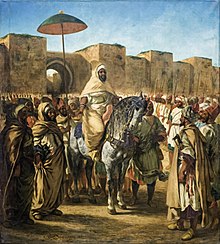Mulai Abd ar-Rahman
Mulai Abd ar-Rahman ( Arabic مولاي عبد الرحمن, DMG Mūlāy ʿAbd al-Raḥmān ) (* 1778 in Marrakech [place and year of birth are disputed]; † 1859 in Meknes ) was Sultan of the Alawids in Morocco from 1822 until his death .
Life
Mulai Abd ar-Rahman took over from his uncle Mulai Sulaiman (r. 1798-1822) in 1822 . After the pacification of the brotherhoods and the marabouts , he began to expand the imperial administration. As a result, control of the Berber tribes in the Atlas Mountains and southern Morocco was increased. Several uprisings against this increasing integration into the state were suppressed. In order to secure the support of the population for his politics, however, the Muslim brotherhoods had to be promoted, which had a great influence on the simple population and the tribes.
While the still weak central government ( makhzen ) was being expanded internally , Abd ar-Rahman suffered setbacks in foreign policy. To compensate for a lack of tax revenue, the Sultan tried to revive international trade that had been suspended by his predecessor and concluded several trade agreements with European nations. But he also decided to allow the profitable institution of piracy by the barbarian corsairs again, which led to a military confrontation with the European trading powers. In 1828 the British blocked the port of Tangier , a year later the Atlantic ports of Larache , Arzila and Tétouan were bombed by the Austrian fleet, and only then was piracy stopped by Abd ar-Rahman. The last military retaliation for piracy was against the city of Salé in 1851 .
Another confrontation occurred with France , which had occupied neighboring Algeria in 1830 and there met the resistance of Abd al-Qadir , who was supported by Morocco . When tensions escalated in a war, the Moroccan army was defeated by French troops on August 14, 1844 on the Isly River . Morocco had to stop aid to Abd al-Qadir and agree to the definition of the borders with Algeria.
In 1856, Mulai Abd al-Rahman founded the souk of Zraqten on the north side of the High Atlas, and expanded his territory to the south to include the areas controlled by the Glaouis , a tri-regional tribal dynasty, thereby succeeding both local ones Taxing trade as well as the caravans coming from the Sahara and Tafilalet .
Despite a few setbacks, Abd al-Rahman succeeded in consolidating the sultan's central power, as well as limiting the influence of the European powers on the Alawid Empire. He was succeeded by his son Sidi Muhammad IV (1859–1873).
literature
- Jean Brignon et al: Histoire du Maroc. Librairie Nationale Casablanca 1994.
- Richard Pennell: Morocco Since 1830. A History. Hurst, London 2000, ISBN 1-85065-426-3 .
- Moulay Abderrahmane in: Bernard Lugan: Histoire du Maroc: Des origines à nos jours. Ellipses 2011, ISBN 978-2729863524 , pp. 201-210.
- Issa Babana El Alaoui: Moulay Abderrahmane (1822-1859). In: Histoire de la dynastie régnante au Maroc. Paris, Fabert, 2008, ISBN 978-2849220504 , pp. 81-86
| personal data | |
|---|---|
| SURNAME | Abd ar-Rahman, Mulai |
| ALTERNATIVE NAMES | مولاي عبد الرحمن (Arabic) |
| BRIEF DESCRIPTION | Sultan of the Alawids in Morocco (1822-1859) |
| DATE OF BIRTH | 1778 |
| PLACE OF BIRTH | Marrakech |
| DATE OF DEATH | 1859 |
| Place of death | Meknes |

